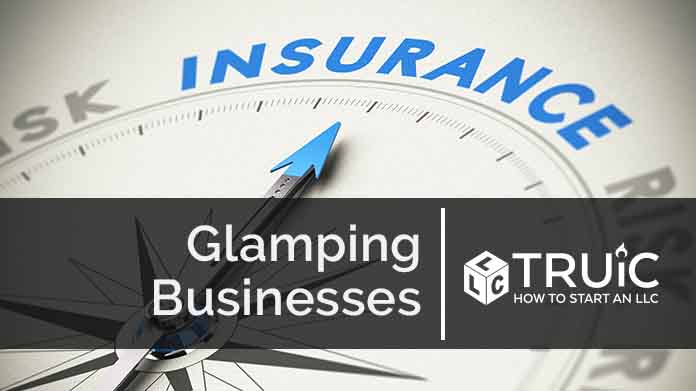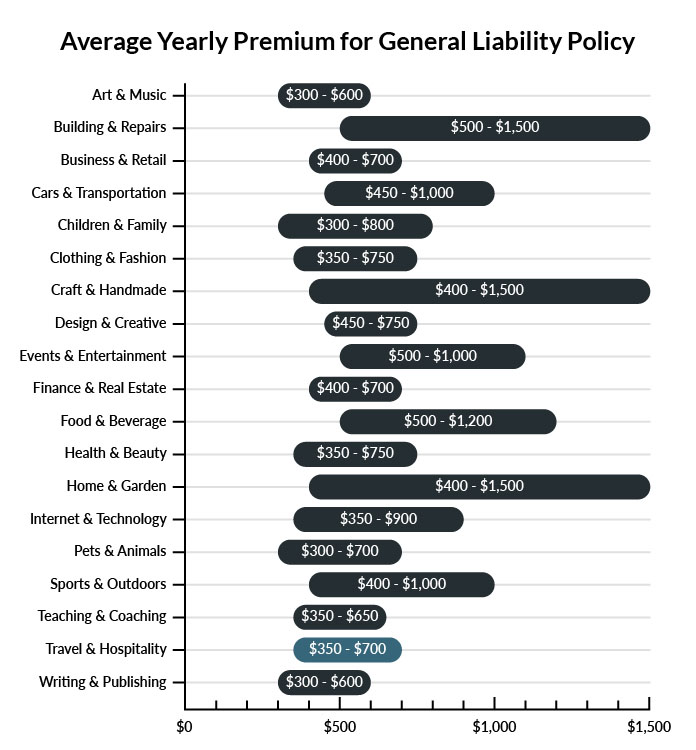Glamping Business Insurance
Getting insurance for your glamping business is essential.
Glamping businesses need to be protected against things like claims of personal injury, environmental damage, and false advertising.
For example, your glamping activities are found to be disrupting the surrounding environment, or customers claim that your premises are not as luxurious as advertised.
We’ll help you find the most personalized and affordable coverage for your unique business.

Recommended: Ergo Next Insurance is dedicated to matching small businesses with the right policy at the best price.
Best Insurance for a Glamping Business
General liability insurance is — generally speaking — one of the most important insurance policies for glamping businesses.
Some of the risks general liability insurance covers are:
- Bodily injury
- Property damage
- Medical payments
- Legal defense and judgment
- Personal and advertising injury
Your glamping business may also find some of the following insurance policies to be beneficial, especially when used alongside general liability:
- Commercial property insurance
- Workers’ compensation insurance
- Data breach insurance
- Commercial umbrella insurance
Firms that sell business coverage are known as insurance providers or insurers. They are generally categorized into one of the following groups:
- Traditional brick-and-mortar insurers — Describes firms with a physical store or office (such as The Hartford or Hiscox), which also commonly hire insurance agents. Naturally, this incurs a higher operating cost, which translates to higher fees too.
- Online insurers — Describes firms that are based purely online (e.g., Tivly and Ergo Next). In doing so, these firms are far better able to offer quality insurance at an affordable price as their overheads are far lower.
Let’s Find the Coverage You Need
The best insurers design exactly the coverage you need at the most affordable price.
Cost of General Liability Insurance
On average, glamping businesses in America spend between $350 – $700 per year for $1 million in general liability coverage.
Compare the average cost of general liability insurance for a glamping business to other professional industries using the graph below.
Several factors will determine the price of your policy. These include your:
- Location
- Deductible
- Number of employees
- Per-occurrence limit
- General aggregate limit
You may be able to acquire general liability insurance at a discounted rate by purchasing it as part of a business owner’s policy (BOP) rather than as a standalone policy.
A BOP is a more comprehensive solution that includes multiple forms of coverage, such as business interruption and property insurance.

Find the Best Rate
Discover the best coverage at the lowest rate in our affordable business insurance review.
Common Situations That General Liability Insurance May Cover for a Glamping Business
Example 1: While walking to your restroom, a customer trips over a box, breaks a wrist, and demands your business pay for her ambulance ride and medical treatment. General liability insurance would cover her medical expenses and any additional damages if she flies a lawsuit.
Example 2: As an employee arranges a new luxury campsite display in your showroom, she accidentally drops a box onto a customer’s head. The customer suffers a serious head injury and decides to sue your business for medical treatment and additional damages. General liability insurance would pay for your legal defense and any required settlement.
Example 3: A local competitor sues your business, claiming you libeled her company in your recent advertising campaign. While you disagree with the claim, you want to hire an attorney immediately. General liability insurance would cover your legal defense and any required settlement.
Other Types of Coverage Glamping Businesses Need
While general liability is the most important type of insurance to have, there are several other forms of coverage you should be aware of. Below are some of the most common types of coverage:
Commercial Property Insurance
You made a major investment in your business real estate, inventory, equipment, and supplies. In the event of a fire, theft, or natural disaster, commercial property insurance would cover the cost of repairing or replacing your business-related property. This includes structural damage to your building and the business materials you store there.
Workers’ Compensation Insurance
Most states require businesses to carry workers’ compensation insurance for their part-time and full-time employees. This coverage protects your employees if they become injured at work or fall ill after a work-related accident. It not only covers an employee’s medical bills and lost wages if they need time to recover, but also any disability or death benefits stemming from a workplace accident.
Data Breach Insurance
Also known as cyber attack insurance, this coverage protects your business from liability if a cybercriminal hacks into your computer system, steals sensitive customer data, and your customers sue you for damages. In the event of such a lawsuit, data breach insurance would cover your legal fees and any settlement payouts.
Commercial Umbrella Insurance
While your general liability insurance policy covers most claims, some accidents or lawsuits may be so catastrophic that they threaten to exhaust the limits of your primary coverage. Commercial umbrella insurance protects you from paying out-of-pocket for any legal fees and awarded damages that exceed your primary policy.
Additional Steps To Protect Your Business
Although it’s easy (and essential) to invest in business insurance, it shouldn’t be your only defense.
Here are several things you can do to better protect your glamping business:
- Use legally robust contracts and other business documents. (We offer free templates for some of the most common legal forms.)
- Set up an LLC or corporation to protect your personal assets. (Visit our step-by-step guides to learn how to form an LLC or corporation in your state.)
- Stay up to date with business licensing.
- Maintain your corporate veil.
Glamping Business Insurance FAQ
Yes, absolutely. You will need to first get a quote from an online business insurance provider like Ergo Next Insurance. Ergo Next allows you to then purchase a policy immediately and your coverage will be active within 48 hours.
A typical business owner’s policy includes general liability, business interruption, and commercial property insurance. However, BOPs are often customizable, so your agent may recommend adding professional liability, commercial auto, or other types of coverage to your package depending on your company’s needs.
“Business insurance” is a generic term used to describe many different types of coverage a business may need. General liability insurance, on the other hand, is a specific type of coverage that business owners need to protect their assets.
Your glamping business is going to need business insurance before it launches.
Even if it is not required by law to purchase specific policies (e.g., workers’ compensation or commercial auto), insurance is an invaluable and essential tool for any business that intends to insulate from the damaging effects of the risks they will face.
Not necessarily. Certain exceptions may be written directly into your glamping business insurance policy, and some perils may be entirely uninsurable.
Yes, an LLC is meant to create a legal barrier between your business and your personal assets and credit. If you haven’t formed an LLC yet, use our Form an LLC guide to get started.
An LLC doesn’t protect your business assets from lawsuits and liability– that’s where business insurance comes in. Business insurance helps protect your business from liability and risk.